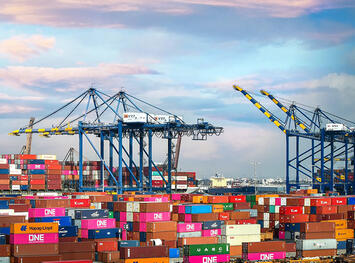
To some in the Biden Administration, the supply chain crisis can be dismissed as a loss of East Asian-made consumer trinkets that, as Vox tells us, we could all be better off without—or as White House spokesperson Jen Psaki suggested, amounts to little more than “the tragedy of the delayed treadmill.” Yet, in reality, a broken supply chain is hardly a rich man’s problem—global bankers are having their best year ever—but mostly impacts ordinary folks suffering from rising prices for everything from soybeans to natural gas. The crisis is now expected to last for at least a year.
The chaos on the ground level may not much hurt the elites of Manhattan or Palo Alto, but inflation, which is now expected to continue apace for at least the next year, has wiped out wage gains in the U.S., the UK, and Germany. Low-income groups are the most threatened, struggling to pay energy costs, surging rents, and higher food prices. All this is also eroding President Biden’s already weak poll numbers.
Our vulnerability to supply chain disruption clearly predates the Biden Administration, forged by the abandonment of the production economy over the past 50 years by American business and government, encouraged and applauded by the clerisy of business consultants. The result has been massive trade deficits that now extend to high-tech products, and even components for military goods, many of which are now produced in China. When companies move production abroad, they often follow up by shifting research and development as well. All we are left with is advertising the products, and ringing up the sales, assuming they arrive.
Unable to stock shelves, procure parts, power your home, or even protect your own country without waiting for your ship to come in, Americans are now unusually vulnerable to shipping rates shooting up to ten times higher than before the pandemic. Not surprisingly, pessimism about America’s direction, after a brief improvement Biden’s election, has risen by 20 points. The shipping crisis is now projected to last through 2023.
Not everyone loses here. For years the American establishment saw China as more of an opportunity than a danger. High-tech firms, entertainment companies, and investment banks profit, or hope to, from our dependency, becoming in essence the new “China lobby.” Behind the scenes these representatives of enlightened capital often work to prevent condemnation for the Middle Kingdom’s mercantilist policy, and its joint repression of democracy and ethnic minorities.
After all, the pain is not felt in elite coastal enclaves, but in Youngstown, south Los Angeles, and myriad other decaying locales. Meanwhile, by enabling China’s focus on production, and the conquest of technologies related to making goods, we have devastated large parts of our country. This shift has cost us 3.7 million jobs since 2000. Throughout the period between 2004 and 2017, the U.S. share of world manufacturing shrank from 15 to 10 percent, while our reliance on Chinese inputs doubled, even as our dependence on Japan and Germany shrank.
Yet perhaps even more debilitating has been our drift towards what British historian Martin Weiner has called “psychological de-industrialization.” Weiner was referring to the lack of interest in productive enterprise during late Victorian and Edwardian England, but he could just as easily be describing contemporary America’s corporate and financial elite.
Fortunately, America is not England, now a shadow of itself as an industrial country, living off its imperial connections to bolster its media, finance, and tourism sectors. It is a small country, at the edge of a fading continent in seemingly permanent decline. It lacks our vast expanse with its agricultural, energy, and other resources, not to mention our still considerable entrepreneurial spirit. As a huge continental country with enormous resources, lots of arable land and a large, traditionally hard-working population, the United States should be ideally suited to survive the retreat of the global economy, so evident in the supply chain crisis, and be able to shift to a more autarchic model.
Read the rest of this piece at American Mind.
Joel Kotkin is the author of The Coming of Neo-Feudalism: A Warning to the Global Middle Class. He is the Roger Hobbs Presidential Fellow in Urban Futures at Chapman University and Executive Director for Urban Reform Institute. Learn more at joelkotkin.com and follow him on Twitter @joelkotkin.
Photo: Barrett Ward via Unsplash.












